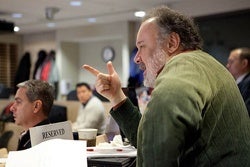March 29, 2011 — When the Deepwater Horizon oil rig exploded April 20, 2010, killing 11 workers, injuring dozens and spewing thousands of barrels of oil for days into the Gulf of Mexico, the disaster was more than a classroom discussion for some faculty, students and staff of Harvard’s National Preparedness Leadership Initiative (NPLI).
Just days after the incident, NPLI co-director Leonard Marcus, lecturer on public health practice at Harvard School of Public Health (HSPH), Barry Dorn, adjunct lecturer on health policy and management at HSPH, and NPLI senior editorial associate Eric McNulty were in a different “classroom” – coastal Louisiana studying how the crisis was being led.
“While it took considerable time to get control of the spill, one of the significant accomplishments of the response was the ability to align many different people and organizations to mount the best possible response to this complex event,” Marcus said. He observed that “the many jurisdictional lines of authority – federal, state, and local – and their different priorities for managing the spill greatly complicated the response. The focus of meta-leadership is meeting the challenge of getting these many organizations in concert with each other and collaborating with the private and non-profit sectors. Meta-leadership in practice demands influence well beyond authority, he said.

The NPLI is a joint program of HSPH and the Harvard Kennedy School and is co-directed by Marcus and David Gergen, director of the Center for Public Leadership at HKS. More than 350 emergency preparedness leaders have participated in its executive education program. Established in 2004, the NPLI helps ensure that public officials are prepared to meet the challenges of terrorist events, natural disasters, and disease outbreaks through training and research that reaches across lines of government jurisdiction and into the private sector. The initiative is supported by the U.S. Centers for Disease Control and Prevention (CDC).
“Once we have good plans in place, we must invest far more in leadership training for first-responders. We must make sure they have all the resources and practice they need. After that, we must unleash them to attack a crisis with full force and authority,” Gergen said.
“One of the truly unique things about the NPLI is that the faculty are on the ground during events like Deepwater Horizon and hurricane Katrina to see what happens in the field,” Marcus explained.
Four response leaders from the oil spill – including three NPLI alums – gathered this winter at Harvard Kennedy School to share experiences at an intensive week-long NPLI. They were among about 50 emergency management and other government officials – ranging from the Office of the Director of National Intelligence and the Department of Homeland Security to the CDC – who participated.
“In a crisis, it’s the leadership that makes the difference,” said Marcus, who along with Dorn, Isaac Ashkenazi, director of the program’s Urban Terrorism Preparedness Project, and Joe Henderson of the CDC, developed the meta-leadership framework.
“The students learn from us and we learn from the students. The virtuous circle of classroom-to-practice and practice-to-classroom validates the curriculum and demonstrates the impact that Harvard is having in the real world,” Marcus said. “Agencies are better able to serve the population and reduce loss of life,” he said.
“This course knocks the socks off of anything else I’ve taken on emergency preparedness,” said participant Carol Cunningham, an emergency medicine physician and state medical director of emergency medical services in Ohio. “I found the program infinitely valuable. Emergency preparedness starts at home and, by applying meta-leadership skills, I hope it will trickle down to local agencies,” she said.

Others sharing expertise at the winter session included Admiral Thad Allen, Commandant of the Coast Guard, and HSPH’s Robert Blendon, senior associate dean for policy translation and leadership development and professor of health policy and political analysis.
In his lecture, Blendon discussed factors that drive public response to emergencies. Mostly, he said, it is the “chip in the brain” – preconceived ideas – that guide how people act. “The public doesn’t respond to a major disaster unless they feel personally threatened,” Blendon said. “People generally act to protect themselves and their families based on their perception of the situation, even if it’s incorrect.”
At the conclusion of the week participants were assigned to teams to work on six-month meta-leadership projects. In June they will return to Harvard to report on their projects, which often end up as actual policies and procedures. One project from a previous cohort has taken on a life of its own: Richard Hunt, director of the Division of Injury Response in the CDC’s National Center for Injury Prevention and Control, convened representatives from cities that have experienced terrorist attacks with those from cities that have had limited real-life experience to share best practices at NPLI’s fifth “Tale of Our Cities” program held on March 14-16, 2011.
NPLI participant Timothy Connolly of Boston’s National Counterterrorism Center and his team are using the mock scenario of a terrorist attack on liquefied natural gas storage tanks in Boston to explore how to facilitate information sharing between first responders and other agencies during emergencies. “Unless information is shared, we won’t be able to solve the problem,” Connolly said.
Daniel O’Connor of Homeland Security headquarters in Washington, D.C., agreed. “You impressed upon us that we need to go home and create a different way of doing things. If we don’t make changes (in the emergency preparedness process), the change won’t happen.”
—Marge Dwyer
